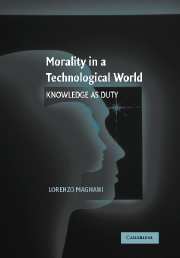Book contents
- Frontmatter
- Contents
- Preface
- 1 Respecting People as Things: Environment
- 2 Treating People as Means: Cloning
- 3 Hybrid People, Hybrid Selves: Artifacts, Consciousness, Free Will
- 4 Knowledge as Duty: Cyberprivacy
- 5 Freedom and Responsibility: Bad Faith
- 6 Creating Ethics: Good Reasons and Good Arguments
- 7 Inferring Reasons: Practical Reasoning, Abduction, Moral Mediators
- Afterword
- References
- Index
1 - Respecting People as Things: Environment
Published online by Cambridge University Press: 18 July 2009
- Frontmatter
- Contents
- Preface
- 1 Respecting People as Things: Environment
- 2 Treating People as Means: Cloning
- 3 Hybrid People, Hybrid Selves: Artifacts, Consciousness, Free Will
- 4 Knowledge as Duty: Cyberprivacy
- 5 Freedom and Responsibility: Bad Faith
- 6 Creating Ethics: Good Reasons and Good Arguments
- 7 Inferring Reasons: Practical Reasoning, Abduction, Moral Mediators
- Afterword
- References
- Index
Summary
Now, I say, man and, in general, every rational being exists as an end in himself and not merely as a means to be arbitrarily used by this or that will.
Immanuel Kant, Groundwork of the Metaphysics of MoralsKnowledge, I believe, is fundamental to ethical reasoning, and it must therefore be considered a duty in our morally complex technological world. While I will explore this claim in detail in chapter 4, it is useful to introduce the argument here: if we are to regard knowledge in this new light, we must first understand how knowledge can render an entity moral. To recall our example from the Preface, moral attitudes toward women have greatly evolved over the centuries in Western society, and as our societies have gained greater knowledge, we have ascribed new kinds of value to women. As a result, the cultural default setting is generally that women have an “intrinsic” worth equal to men's.
If acts of cognition can influence moral value, I contend that we can improve the lot of many, many people by altering the way we think about them, and one way to do so is to treat them as things. This notion, of course, flies in the face of Kant's maxim that people should not be regarded as a means to an end – that is, that they should not be seen as “things.”
- Type
- Chapter
- Information
- Morality in a Technological WorldKnowledge as Duty, pp. 1 - 29Publisher: Cambridge University PressPrint publication year: 2007



